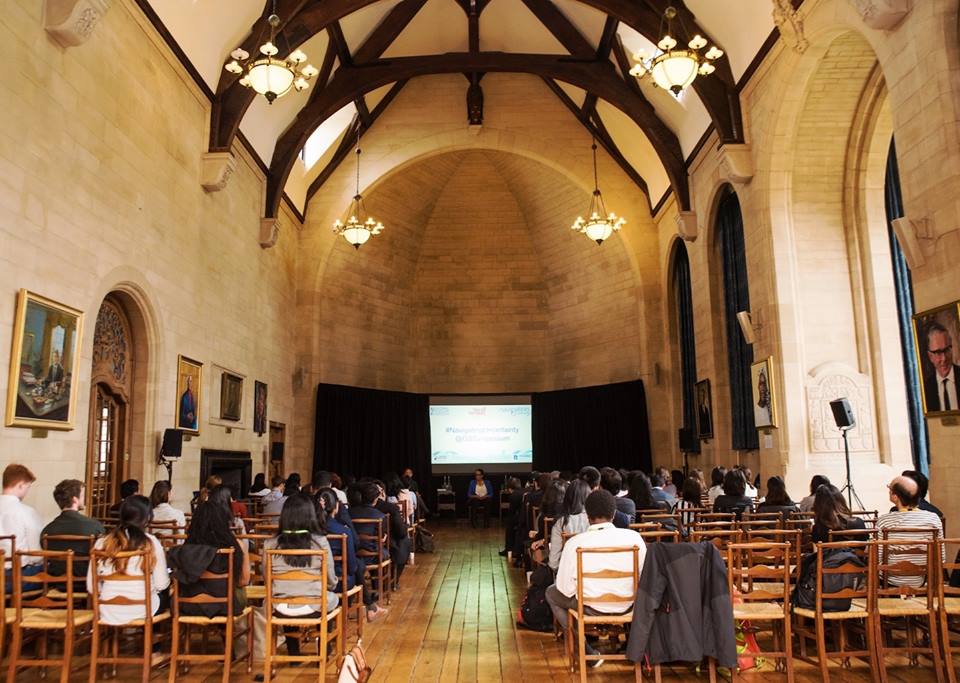
The Global Scholars Symposium brought together international scholars to reflect on how to tackle 21st century uncertainties.
The GSS programme demonstrates the Rhodes and Gates Cambridge Scholarships’ unwavering belief in the generative power of bringing together young scholars and world leaders to interrogate important and fundamental questions.
Global Scholars Symposium
Scholars need to collaboratively design new institutions to tackle the crises of the 21st century world, the first Chief Prosecutor of the International Criminal Court told the Global Scholars Symposium last weekend.
Luis Moreno Ocampo gave the opening keynote at the symposium, which was founded by Gates Cambridge and Rhodes scholars in 2008 and aims to connect postgraduate scholars and influencers from diverse fields and across the globe.
Under the theme “Navigating Uncertainty”, the symposium took place at Rhodes House, at the University of Oxford, from 11 – 13 May and brought together leaders whose professions and passions draw them towards uncertainty, or at least require them to engage with it on a regular basis. Drawing knowledge across many disciplines and themes, including the arts, science, business, political/social issues, and even mortality, the symposium aimed to provide useful tools and new approaches to dealing with uncertainty.
Day One included a Business and Economics panel which brought together speakers from the banking industry, entrepreneurship and academia and highlighted contrasting perspectives and provided rich content on universal basic income, business design and the future of banking and cryptocurrencies. Day One concluded with BNY Mellon Managing Director Lynne Marlor’s reflection on the challenges and opportunities new payment platforms and blockchain technologies have brought to the banking industries.
On Day Two, delegates reflected on what makes the human experience meaningful. Satish Modi, philanthropist and author of In Love with Death, spoke about the role of grief, joy, and humility in embracing life and its uncertainty. Meanwhile, the arts and humour panels collectively demonstrated the transformative power of artistic engagements for people combating trauma and loss through theatre and poetry. On the mortality panel, hearing from Hermione Elliot, end of life care provider, Professor Simon Dein, consultant psychiatrist, and Venerable Miao Lung, a buddhist Dharma teacher, delegates were reminded to connect with one another through recognising our individual mortality and vulnerability.
On the last day of the Symposium, Dr Michelangelo Mangano, senior physicist at CERN, drew vivid examples from his career to illustrate how navigating uncertainty is the bedrock of the quest for knowledge. In his keynote, Dr Mangano assured delegates that while uncertainty is typically a liability in human endeavours, the progress of fundamental science builds on uncertainty, as the main goal of science is to extend the domain of our knowledge into the unknown and the uncertain, and to quantify degrees of uncertainty of the understood phenomena.
Following his speech, the astrophysics panel led participants to contemplate the mysteries and wonders of outer space, while reminding them again of how humanity’s aspirations to explore the infinite universe has led to astonishing discoveries applied in everyday life. Cell phone cameras, infrared night vision, and satellite imaging and communications are among the many illustrations. In the afternoon, the Justice and Protection panel discussed the ways in which international society navigates challenges concerning responses to mass atrocities. Delegates were left to consider who gets to define what protection and justice look like and whether the states and the United Nations constitute adequate vehicles for safeguarding population from gross human rights violations. The GSS concluded with Romania-based journalist Laura Stefanut’s presentation of labour exploitation under the “made in EU” label, uncovering the ways in which women in Eastern Europe endure low pay, long hours, humiliating and gruelling work to make clothes for luxury Western brands.
GSS 2018 also provided 10 workshops led by Rhodes scholars and guest speakers. In these small group interactions, delegates explored in-depths topics including migration, #MeToo, algorithmic decision-making, strategic thinking, post-truth, universal basic income, policy advocacy, theatre of the oppressed, international criminal justice and philanthropy.
Since the inaugural symposium, the GSS has expanded to include scholars from 51 countries and nine prestigious scholarships and is now opened the invitation to all postgraduate students in the UK. The GSS is made possible by a generous endowment given by the John McCall MacBain Foundation, with the continued support from the Rhodes Trust and the Gates Cambridge Trust.
The GSS organisers stated: "The success of GSS 2018 attests to the value of bringing scholars from diverse disciplinary and cultural backgrounds. The GSS programme demonstrates the Rhodes and Gates Cambridge Scholarships’ unwavering belief in the generative power of bringing together young scholars and world leaders to interrogate important and fundamental questions."
The next GSS will take place in spring 2019 at the University of Cambridge.












